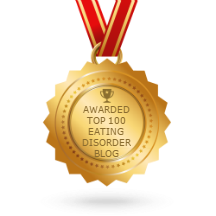- Home
- About
-
Services
- Therapy
-
Eating Disorder Trainings
>
- Clinical Approaches To Treating Body Image Issues
- Clinical Approaches To Treating Bulimia & Binge Eating Disorder
- Finding Freedom From Binge Eating
- Finding Freedom From Anorexia
- Supporting A Loved One With An Eating Disorder
- Eating Disorder Recovery Road Map
- Healing From Body Hate And Practicing Self-Compassion
- Common Questions
- Blog
- Press
- Contact
|
Your recovery from an eating disorder is going strong. You’ve been making progress in terms of facing challenge foods, using positive coping strategies, and are finally starting to see the amazing life that you have without active eating disorder behaviors. Then, a major stressor hits you. Perhaps your relationship just ended, you got a new job, or have an upcoming graduation. You start to justify making changes to your meal plan, skipping therapy appointments, and notice that your thoughts are becoming more preoccupied with food and your body. Your eating disorder voice becomes louder, yet you are in denial that it is starting to take control again. Perhaps this regression ends in a slip of old behaviors or maybe even a full-blown relapse. “Recovery is typically not a linear process, and you may have both successes and setbacks along the way.” It is normal to feel triggered and to experience setbacks while you are in the process of recovery from an eating disorder. If you do experience this, it is important to try to practice some self-compassion. You have not failed, and you simply need more support. Recovery is typically not a linear process, and you may have both successes and setbacks along the way. However, the important thing is that you learn to identify any early warning signs of a slip or relapse. That way you can catch them before things may start to spiral out of control. The following is a brief written exercise that you can do as a personal relapse prevention plan: 1. Make a list on a sheet of paper and divide it into three columns. Label one column as green light signs, the other as yellow light signs, and the third as red light signs. 2. Under green light signs, put a list of the ways that you will know if you are strong in your recovery from an eating disorder. For example, I do not weigh myself or spend much time focusing on my body. 3. Under yellow light signs, put a list of the ways that you would know if you are starting to slip back into old patterns of thinking or behaviors that might lead to a full relapse. For example, I start become more rigid in terms of my food choices. 4. Under red light signs, put a list of the ways that you would know if you were engaged in a slip or relapse. For example, I do x ED behavior. If you feel comfortable, you might consider sharing this plan with your treatment team and/or loved ones so that they will be able to identify any warning signs of a potential slip or relapse. Additionally, if you do notice that you are slipping into yellow light or red light signs, it is a sign of true strength to reach out for help from treatment professionals. If the eating disorder voice is starting to get louder, it is critical that you reach out for professional help and support and also that you remind yourself why you started the recovery process to begin with. Living in an active eating disorder is ultimately a very miserable place to be. No one chooses to develop an eating disorder, but you can choose to work towards recovery at any time. Even if you’ve had a slip, relapse, or setback it does not mean that you failed. What matters is that you are able to recommit to recovery and that you learn something from this experience. After all, you’ve come way to far to give up now. “Recovery is a marathon, not a sprint.” No matter what lies your eating disorder voice may be telling you, your life is worth so much more than obsessing about food, calories, and your body. Full recovery and freedom from an eating disorder is completely possible. However, recovery is a marathon, not a sprint. It may take some time, but ultimately you will find a fulfilling and passion-driven life that doesn’t involve an eating disorder. Marya Hornbacher summed it up best when she stated: “I don’t remember when I stopped counting, or when I stopped caring what size my pants were, or when I started ordering what I wanted to eat and not what seemed ‘safe,’ or when I started just eating when I got hungry, instead of questioning it, obsessing about it, dithering and freaking out, as I’d done for nearly my whole life. I don’t remember exactly when recovery took hold, and went from being something I both fought and wanted, to being simply a way of life. A way of life that is, let me tell you, infinitely more peaceful, infinitely happier, and infinitely more free than life with an eating disorder. And I wouldn’t give up this life of freedom for the world.” Jennifer Rollin, MSW, LCSW-C: is an eating disorder therapist in private practice in Rockville, Maryland. Jennifer specializes in helping adolescents and adults struggling with eating disorders, including anorexia, binge eating disorder, and bulimia, body image issues, anxiety, and depression. Jennifer offers eating disorder therapy in Rockville, Maryland, and eating disorder recovery coaching via phone/Skype. Eating Disorder Therapy easily accessible to people in Potomac, Bethesda, Germantown, Olney, Silver Spring, Maryland, and Washington D.C.
0 Comments
Your recovery from an eating disorder is going strong. You’ve been making progress in terms of facing challenge foods, working diligently with your therapist and nutritionist, and are finally starting to see the amazing life that you have without active eating disorder behaviors. Then, a major stressor hits you. Perhaps your relationship just ended, you got a new job, or have an upcoming graduation. You start to justify cutting back on meals, skipping therapy appointments, and notice that your thoughts are becoming more preoccupied with food and your body. Your eating disorder voice becomes louder, yet you are in denial that it is starting to take control again. Perhaps this regression ends in a slip of old behaviors or maybe even a full-blown relapse. The following are three tips for rising strong following a lapse or relapse in eating disorder recovery. 1. Reach out for support from a trained professional. You may feel embarrassed or ashamed to admit that you are struggling again. However, reaching out for support when you are struggling is a sign of true strength, not weakness. If you are slipping in your recovery, it’s critical that you reach out to a therapist and/or registered dietitian who specializes in eating disorders. Additionally, it’s important to be honest with them about the disordered behaviors that you are currently struggling with. Your "eating disorder voice," may tell you that you aren't "sick enough" to seek help. This is utterly false. Everyone who is struggling, deserves access to help and support. No one should have to recover from their eating disorder alone. You deserve to have support to help you to get back on track in your recovery. 2. Remind yourself of your reasons to recover. When things feel hopeless or “too challenging”, it can be tough to find motivation to continue to work on your recovery. Many of my clients with eating disorders struggle with “black and white thinking.” For instance, you could be telling yourself something like, “I already failed at my recovery, I may as well just give up.” If these kinds of unhelpful thoughts start to pop up, it’s crucial that you remind yourself of your reasons to recover. For instance, one exercise that I often ask clients to do is to imagine what their life could look like 5 years from now if they stay trapped in their eating disorder vs. five years from now if they are recovered. You deserve a full life, one that you cannot have if you continue to stay stuck in your eating disorder. 3. Practice self-compassion. It's important to note that you are certainly not alone in experiencing a relapse or lapse in eating disorder recovery. If you do experience this, it is important to try to practice some self-compassion. “Beating yourself up” for struggling, will only serve to make you feel even worse. You have not failed; you simply need more support. Recovery is typically not a linear process, and you may have both successes and setbacks along the way. Additionally, it’s important to note that you are not “starting again from square one.” Just because you had a relapse, does not invalidate all of the progress that you have already made. Instead, of viewing your relapse or lapse as a “failure,” try to reframe it as an opportunity to learn from. You may just find that you emerge an even stronger person after having overcome the latest setback in your recovery. You Deserve A Full Life When you look back on your life at age 80, do you think that you will be fondly reminiscing about the amount of time you spent counting calories, avoiding social events, running obsessively on the treadmill, or hiding empty cartons of food in shame? Living trapped in an eating disorder is ultimately not a fulfilling life. You didn’t choose to have an eating disorder, but you can make the choice to continue on the path towards recovery. No matter what lies your eating disorder may be telling you, your life is worth so much more than obsessing about food and your body. Imagine all of the amazing things you could accomplish if you devoted this time and energy to something positive. It may take some time, but I believe you will find a fulfilling and passion-driven life, one where you can finally say, “I am recovered.” Jennifer Rollin, MSW, LCSW-C: is an eating disorder therapist in private practice in Rockville, Maryland. Jennifer specializes in helping adolescents and adults struggling with eating disorders, body image issues, anxiety, and depression. Jennifer offers eating disorder therapy to individuals in Maryland and D.C. and eating disorder recovery coaching via phone/Skype. Eating Disorder Therapy easily accessible to people in Potomac, Bethesda, Germantown, Olney, Silver Spring, Maryland, and Washington D.C.
We all have that “inner critic” voice in our heads. This “inner bully” is that nagging and persistent voice, which tells us unkind or even downright mean things. Some people are reluctant to challenge their “inner bully,” as they believe that it serves to motivate them. However, this assumption is incorrect. While it is impossible to completely get rid of your “inner bully,” you can take away a lot of its power through the practice of self-compassion. In my work as a therapist in private practice in Rockville, MD, specializing in helping teens and adults struggling with eating disorders, body-image issues, and anxiety, I often use elements of dialectical behavioral and cognitive behavioral therapy, as well as helping clients to practice self-compassion. I’m seen the amazing impact that practicing self-compassion has had on the clients that I work with. I’ve also developed my own personal practice of self-compassion over the years, which has truly transformed the way that I work and live. Self-Compassion Self-compassion is not some new-age concept reserved for the spiritually enlightened. Rather it is a simple practice that can have transformative power in our lives. Practicing self-compassion is also not the same thing as being self-centered. Self-compassion is simply treating yourself with the same kindness and care that you would extend to someone that you love. Additionally, self-compassion is different from self-esteem, in that self-esteem is often largely hinged on external accomplishments. Thus, self-esteem is prone to fluctuate depending on one’s perceived successes and setbacks. However, self-compassion is always available to us, regardless of our external circumstances. According to Kristen Neff, a self-compassion researcher, the three components of self-compassion are self-kindness, common humanity, and mindfulness. Self-kindness entails being understanding and warm to ourselves when we fail or make mistakes. Common humanity is simply recognizing that suffering and setbacks are normal and expected parts of life that everyone will encounter. The element of mindfulness involves observing our emotions and thoughts in a nonjudgmental manner. Putting it into Practice 1. Notice any self-critical thoughts that you are having. The first step is to simply start to notice any self-critical thoughts that you are having. Try not to beat yourself up for having these thoughts. Rather, acknowledge that they are there and start to develop an awareness of your “triggers,” when it comes to your “inner bully voice” getting louder. 2. Acknowledge that you are not alone in what you are experiencing. The next step is to acknowledge that you are not alone in what you are experiencing. Whether you feel that you have fallen short, made a mistake, or had a setback, it’s important to recognize that this is part of the human experience. You are certainty not alone in this. Further, a life without experiences of failure, setbacks, and mistakes, would likely lack meaning and growth. 3. Practice responding to yourself with kindness. A crucial part of self-compassion is practicing responding to yourself with kindness, both through words and actions. An example: Inner Bully: You sounded so dumb and anxious during that interview. You totally flubbed that question about your past experience. They are never going to hire you. Compassionate Voice: It’s understandable that you felt nervous during your interview. Many people get anxious during interviews. You did the best you could and no matter the outcome, it was brave to put yourself out there. In addition to speaking to yourself gently and kindly, you can also work to practice acts of self-compassion, which could include taking time out for self-care, setting healthy boundaries with others, and doing kind things for yourself. The Bottom Line Like any other skill, self-compassion is a practice and it can take time for this way of responding to yourself to become more engrained. Therefore, it’s important that you do not “beat yourself up” for not always being compassionate with yourself. Ultimately, you deserve to treat yourself with the same kindness and care that you give to people you love. Jennifer Rollin, MSW, LCSW-C is a therapist in private practice in Rockville, Maryland. Jennifer specializes in helping adolescents and adults struggling with eating disorders, body image issues, anxiety, and depression. Jennifer offers eating disorder therapy to individuals in Maryland, and eating disorder recovery coaching via phone/Skype. This article was originally featured on The Huffington Post. |
About MeI'm an eating disorder therapist in private practice in Rockville, MD. Archives
June 2024
|




 RSS Feed
RSS Feed
